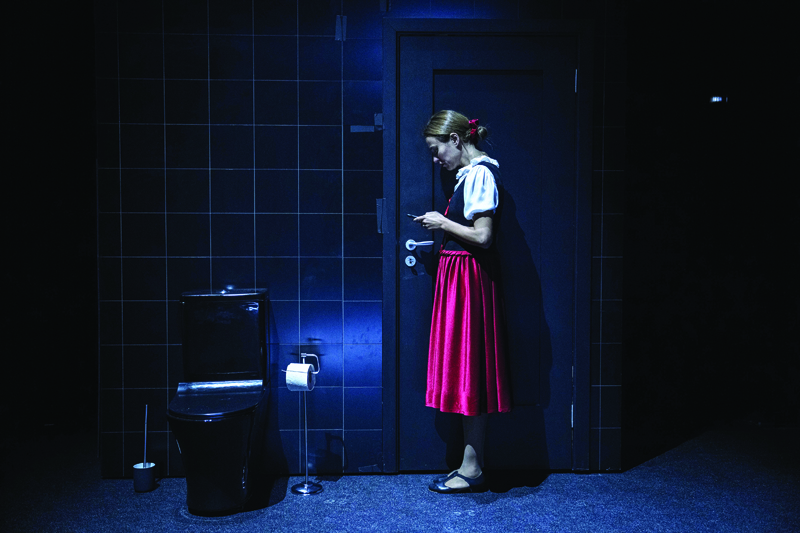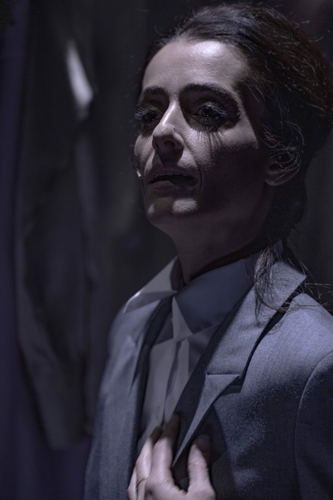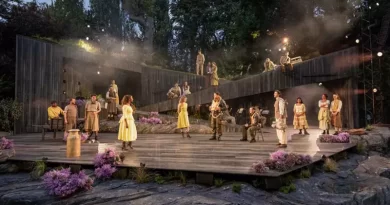“Nora” at the National Theater Ivan Vazov, Bulgaria
Sasho Ognenovski in Sofia
17th April 2023
Nora (often used as an alternative title for A Doll’s House) is Ibsen’s most significant play. It talks about the relationship between love (devotion) and pride. This great Scandinavian dramatist stresses that the status of women in modern society is uncertain and a compelling subject for our attention. Marriage as an institution is investigated and the crueler probing into the subject by Ingmar Bergman is clearly signposted. Sequels are rife and one could be seen in London recently.
Nora is part of a male society where she is reduced to a catalyst of marital volatility, and the moment that she starts acting independently she becomes a problem called marital imbalance or in the language of the common man, unwashed shame.
As with Hedda Gabler, here Ibsen breaks away from the functioning of a marriage that classifies the woman and the man in mainstream society’s allotted places or “where they belong”. He asks many questions related to the independence of the woman within the narrow confines of marriage decision-making. Those questions are answered rigorously by the Austrian playwright Elfriede Jelinek in her sequel What Happened After Nora Left Her Husband or the Pillars of Society, opening a Pandora’s Box of the sufferings of modern woman who set out to take care of themselves and gets to know their true characters at the same time.

Radina Krjilova as Nora.
Photo credit: Stefan N. Shterev.
Ibsen’s Nora says: “I must stand on my own two feet if I want to know myself and the outside world. That’s why I can no longer stay with you.” This is what she says to Torvald who, in Elfriede Jelinek’s sequel, tries to win her back without paying attention to social status or the roles to be played in the scheme of compatible modern marriages.
The project I review here, Nora by Russian director Timofey Kulyabin, is devoted to the manipulative litmus test of the text. That’s why many of the events take place through messages from cell phones, social networks and hashtags.
Social networks maintain their dominance in the twenty-first century precisely through the prism of the manipulation of all of us who have become invented names, and in a very small number of cases, personalities. The relationship between Ibsen’s drama and Kulyabin’s dramaturgical premise is also based on the depersonalization of the most important characters of the institution of marriage.

Ana Papadopoupou as Mrs. Linde.
Photo credit: Stefan N. Shterev.
The action in his directing concept takes place in completely different spaces, and lines are exchanged through messages that are occasionally (depending on the emotional makeup of the character) grammatically incorrect, being occasionally corrected.
The dramaturge Roman Dolzhanski perpetuates Ibsen’s stage notions and locates the entire action in those places to which young spouses gravitate during a working day where the wife is the one who stays with the family and the children, and the husband is the one who takes care of the economic survival of the family.
It is this traditionalist and modern mixing that opens up the incompatible moments in this directing concept. Namely, instead of Torvald Helmer’s house, the action takes place in a small restaurant, at a barber’s, at a tarantella class attended by Nora and in the banking offices of Torvald and Krogstad. Of course, the tension of the events is generated by the messages which are a strong equivalent of the emotional range between the actors and that approach. Post-dramatic distancing makes the issues of this play extremely topical. Although in the conventional sense this approach at first glance appears unrewarding territory for actors playing the characters of Torvald and Nora, it seems that the reimagining leaves a strong impression.
The second part of the show, which uncovers the secrets between Nora and Torvald, focuses more on a lively dialogue that takes place in Torvald’s house but here too there is that tension of the twenty-first century where social networks change all our lives. Of course, we should be clear that this concept is brave because Kulyabin managed to maintain his attitude until the end of the play by which I mean to be consistent with it. What seems to be the main takeaway from Ibsen’s dramatic premise is precisely the manipulation mentioned above.
In the twenty-first century the most expensive thing is the truth and there is less and less of it. Manipulation creates an illusion that can have a fatal consequence, and the marriage is subject to misunderstanding whose effects make a return unfeasible.
Kulyabin opens those questions precisely through the reactions of the actors after receiving the messages, the tensions that are created in situations outside of Ibsen’s basic dramaturgy. The relevance of this innovative staging is not only in the use of social networks but in portrayal of their consumption and their addictive nature.
In this play, the director speaks with the language of a lie being served to us all for many years as the only possible truth. Nora and Torvald are thrown into that sea of tensions and misunderstandings, and the breakdown of their marriage is extremely suggestive at a time when everything is solvable and nothing can surprise us. In this directorial treatment, Kulyabin speaks bravely about the remythologizing of minor misunderstandings that in the virtual world become a major cause of disintegration.
Radina Krjilova’s Nora, the entanglement in the intrigue, exudes much emotional energy. This wonderful actress suggests a significant emotional range within an extraordinary character, a woman who is a victim of her own lack of self-knowledge and her husband’s lack of empathy. It’s a notable achievement by Krjilova in view of the fact that the majority of the play is without a text because she writes it as cellphone messages and on social networks. Krjilova builds a Nora we have never seen before; she is fragile at first sight but with great courage, emotionally layered though with rationality.
This actress reveals features of Ibsen’s Nora we haven’t seen in other productions, notably her deep sadness, her indeterminacy in a world in which she cannot find productivity but also a fragility that she shows in moments when she is alone and without any support. Krjilova opens up Nora with all her complexity, portrays her struggle with modern societal lies as well as expressing the fear of melting into the impersonal world of technology. It’s a brilliant and exciting role.
Ivan Yurukov’s Torvald is a young banker who unexpectedly in the early years of his career, has achieved a position of seniority. This Torvald is a part of the male dominance that has something to boast about and all he preserves is his social success and reputation, a package in which Nora is only one of the elements.
Yurukov portrays his Torvald quite rationally, but with great skill he adds a youthful naivety to the character that leads him to the ambiguous notion that his wife is a criminal who with her stratagems has tried to destroy both his career and their marriage. These are the two polarities between which this talented young actor builds his Torvald.
The characters of Nils Krogstad and Kristina Linde also emerge here. Unlike Torvald, Darin Angelov’s Krogstad is the tense character of a young banker who tries to use his affection for the director’s family and the service he did to his wife for his own career advancement. Angelov plays a character with great tension and it’s Krogstad who acts like an unexploded bomb and finally impresses with the force of his expression. By contrast, Anna Papadopoulou’s Christina Linde is a rather calm friend of Nora who tries to use her involvement in the whole case to her advantage. Tactical and rational, Linde here is a character of great precision.
The perfectly modern scenography and costume design by Oleg Golovko capture a colourful contemporary environment with interiors and exteriors where all the scenes take place simultaneously. Above them there are instances of messages on social networks. The costumes signify a well-to-do class of young people. Timofey Pastukhov’s sound design serves as a witness to the time that passes and brings with it many social misunderstandings.
~









